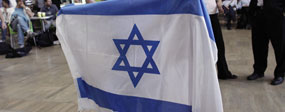 JERUSALEM, Dec 18 (Reuters) - U.S.-led efforts to curb Iran's nuclear programme have resumed since President Barack Obama's re-election and include preparation for possible military action, a senior Israeli official said on Tuesday.
JERUSALEM, Dec 18 (Reuters) - U.S.-led efforts to curb Iran's nuclear programme have resumed since President Barack Obama's re-election and include preparation for possible military action, a senior Israeli official said on Tuesday.The remarks by Vice Prime Minister Moshe Yaalon suggested cautious optimism at prospects for an international resolution to the decade-old standoff with Tehran, though�Israel�says it remains ready to attack its arch-foe alone as a last resort.
Israeli Prime Minister Benjamin Netanyahu has set out a mid-2013 "red line" for tackling Iran's uranium enrichment project. The West says this programme is aimed at developing the means to build atomic bombs. Tehran denies this, saying it is enriching uranium solely for civilian energy.
Yaalon told Army Radio on Tuesday that Israel knew there would be no movement on the issue before the U.S. election in November, but had expected renewed effort after the vote.
"And indeed it has been renewed," he said.
He cited contacts among the United States,�Russia,�France,�China, Britain and�Germany�and Iran about holding new nuclear negotiations, ongoing sanctions against Iran, "and preparations, mainly American for now, for the possibility that military force will have to be used". He did not elaborate.
The P5+1 powers said last week they hoped soon to agree with�Iran�on when and where to meet. There have been suggestions it could happen this month, though January now seems more likely, Western officials say.
ZONE OF IMMUNITY
A former armed forces chief who belongs to Netanyahu's rightist Likud party, Yaalon questioned Obama's resolve on Iran during the Democratic president's first term. By contrast, Israeli Defence Minister Ehud Barak, the lone centrist in Netanyahu's coalition government, argued in Obama's favour.
Yaalon is a frontrunner to succeed Barak, who has announced he will retire from politics after Israel's Jan. 22 election.
On Monday, Barak reiterated Israel's determination to deny Iran the capability to make a nuclear weapon. Israel, widely assumed to have the Middle East's only atomic arsenal, sees a nuclear-armed Iran as a mortal threat.
The prospect of unilateral Israeli air strikes, and ensuing retaliation by Iran, a big oil exporter, and its Islamist guerrilla allies in Lebanon and Gaza, worries world powers.
Speaking to Jewish leaders in New York, Barak acknowledged the limitations of Israel's military against Iran's distant, dispersed and well-defended nuclear facilities.
"The Iranians are deliberately trying to create a level of redundancy and protection for their programme, what we call the 'zone of immunity'. Once they enter the zone of immunity, fate will be out of our hands," Barak said.
"The state of Israel was founded precisely so that our fate would remain in our own hands."
Barak's term "redundancy" refers to Israel's belief that Iran seeks to stockpile raw uranium and enrichment centrifuges on a scale that would allow it to restore independent nuclear capacity should its known facilities be attacked.
The Iranian projects have been dogged by sabotage. While Israel has not publicly claimed responsibility, Yaalon said there could be more in store, in parallel to global economic pressure.
"Sometimes malfunctions happen there - worms, viruses, explosions. Therefore this schedule is not necessarily chronological. It is more technological," he told Army Radio.
"We are, without a doubt, closely tracking developments in the programme there, lest they attempt to pass the red line."
By Reuters
The Iran Project is not responsible for the content of quoted articles.










